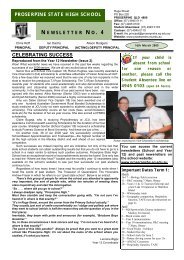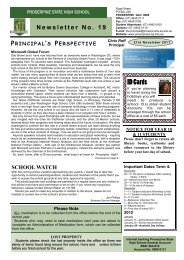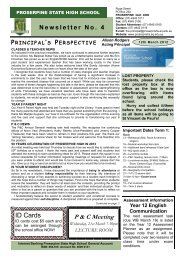2012 #8 - Proserpine State High School
2012 #8 - Proserpine State High School
2012 #8 - Proserpine State High School
You also want an ePaper? Increase the reach of your titles
YUMPU automatically turns print PDFs into web optimized ePapers that Google loves.
Newsletter No. 8<br />
HEALTH MATTERS<br />
Guide to Online Safety<br />
The internet and online technologies, like mobile phones, are<br />
incredible tools. They provide an opportunity to communicate,<br />
learn, play and be entertained by content from around the<br />
world.<br />
As a parent, you have an important role to play in helping to<br />
educate and guide your child in their online experiences. The<br />
following tips provide some helpful points to remember.<br />
TIPS FOR PARENTS…<br />
� Remember that even when children seem to have good<br />
technical knowledge, their online behaviour still requires<br />
parental monitoring and guidance.<br />
� Spend time online with your child—using the internet can<br />
be a fun family activity.<br />
� Try to locate the computer in a shared or visible place in<br />
the home.<br />
� Help your child use the internet as an effective research<br />
tool and teach them that information on the internet is not<br />
always reliable.<br />
� Teach your child positive online etiquette. Encourage<br />
them to treat others online in the same way they would<br />
like to be treated.<br />
� Set rules—make sure your child knows what information<br />
they can share by phone or post online and which websites<br />
they can visit. Discuss the amount of time they can<br />
spend online and ensure they maintain a balance.<br />
� Teach your child that there are ways they can deal with<br />
disturbing material—encourage them not to respond to<br />
any communication that makes them feel uncomfortable<br />
or worried and to report it to a trusted adult.<br />
� Consider using filters, labels and safe zones to help<br />
manage your child‘s online access.<br />
� Reassure your child that access to the internet will not be<br />
denied if they report seeing something inappropriate.<br />
Source: Australian Communications and Media Authority, Cybersmart<br />
program, Cybersafety Contact Centre www.cybersmart.gov.au<br />
Cheers,<br />
Karen Dachs,<br />
<strong>School</strong> Based Youth Health Nurse<br />
Mondays, Tuesdays and alternating Wednesday on<br />
4945 0112 from 8am to 4pm<br />
Senior Ski Trip<br />
Japan January 2013<br />
Just a reminder, that we are organising a trip to Japan during<br />
the last weeks of the Christmas holidays. There are a couple of<br />
vacancies on the trip so if you are new to the school or have<br />
decided you might like to come, see Mrs Farr or Mr Wilson in<br />
the SLC staffroom for some more information.<br />
Principal’s Perspective continued...<br />
Page 2<br />
BULLYING AND HARASSMENT<br />
Bullying Facts (taken from http://www.bullyingnoway.gov.au )<br />
� Approximately one in four year 4 to year 9 Australian<br />
students (27%) report being bullied every few weeks or<br />
more often (considered to be frequent) during the last term<br />
at school.<br />
� Frequent school bullying was highest among year 5 (32%)<br />
and year 8 (29%) students.<br />
� 83% of students who bully others online, also bully others<br />
offline.<br />
� 84% of students who were bullied online were also bullied<br />
offline.<br />
� Peers are present as onlookers in 87% of bullying interactions,<br />
and play a central role in the bullying process.<br />
� Hurtful teasing was the most prevalent of all bullying<br />
behaviours experienced by students, followed by having<br />
hurtful lies told about them.<br />
� Cyber bullying appears to be related to age (or access to<br />
technology), with older students more likely to engage in<br />
cyber bullying than younger students.<br />
How to deal with being bullied....some ideas! (taken from<br />
http://www.kidshelp.com.au )<br />
There are lots of things you can do to deal with bullying. Below<br />
are some ideas.<br />
� Walk away - sometimes this can be the safest option. If<br />
you choose to walk away, go and speak to a teacher or someone<br />
in the school who you trust, especially if the bully has<br />
physically hurt you. This is important as it is possible the<br />
person who is doing the bullying will follow you until they get<br />
the response they are looking for<br />
� Respond - responding to a bully may help give you a<br />
greater sense of power and control. A person's confidence<br />
plays a big part in being able to respond to a bully. Even if you<br />
are not feeling confident, it helps to behave as if you are. To<br />
appear confident, body language and words need to<br />
communicate 'confidence'. Confident body language includes:<br />
� having straight posture (don't slump)<br />
� holding your head up straight<br />
� making eye contact<br />
� using your voice calmly yet firmly (do not express<br />
anger)<br />
� having a pleasant but blank facial expression. Note: If<br />
you keep a 'poker face', the bully will not be able to tell<br />
how you are feeling. This is important, as a bully wants<br />
the person who they are bullying to feel hurt, sad,<br />
confused, upset or angry (or a combination of these). If<br />
you remain emotionless you will not provide any feedback<br />
to them<br />
Talk to someone - if you are being bullied, it is important to tell<br />
an adult you trust, e.g. a teacher, parent or counsellor. When<br />
you speak to this person, try to take your time telling your story<br />
- be honest about who is hurting you and what you would like<br />
done about it. If you speak to a person at school and the<br />
bullying continues, ensure you go back to that person and let<br />
them know. It can also help to keep a diary of bullying incidents<br />
including who was involved, the time it occurred, what<br />
happened and who you told about it<br />
It's important to respond when you see others being<br />
bullied!<br />
If you see someone being bullied at your school, it is really<br />
important that you do not stand around and watch it happen.<br />
Take a stand against it by speaking to a teacher, one of our<br />
behaviour support teachers or guidance officer. If every student<br />
acts when they witness bullying, it will go a long way to<br />
stopping it.<br />
Regards,<br />
Alison Rodgers<br />
“Honour, Serve and Obey”








